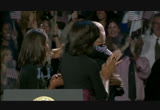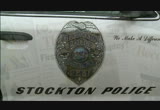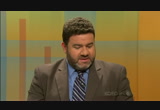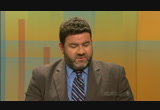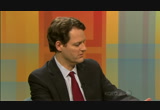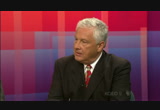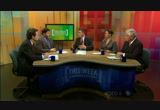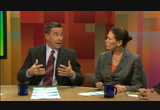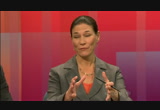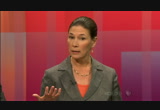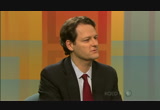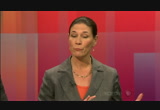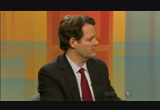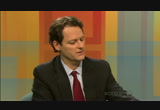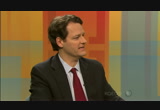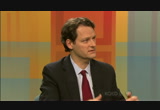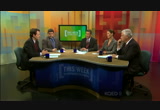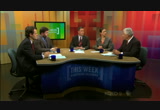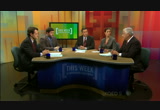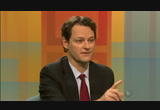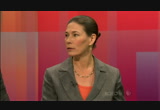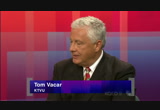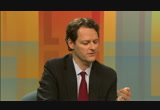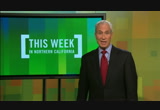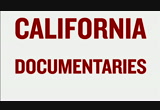tv This Week in Northern California PBS December 29, 2012 1:30am-2:00am PST
1:30 am
that are tom vacar, ktvu news consumer editor, paul rogers, chann channel's "mercury news" environment writer, tyche hendricks, political writer for news, and josh richman, bay area news group political reporter. well to start off, here's a look back at some of the year's memorable moments. >> i, ross mercurimi -- >> the year got off to a rough start for san francisco's new sheriff, ross mercurimi, facing domestic abuse charges and a suspension. throughout the year, politics took center stage, the presidential election the main event, starting with eight serious republican candidates vying for the nomination. ethnic voters flexed their political muscle, giving president obama an unexpectedly early election night win over republican rival mitt romney. california's public education system was saved from severe budget cuts with the november passage of governor brown's
1:31 am
proposition 30, but voters didn't say yes to all taxes. an attempt to tax soda in richmond failed, as did a statewide tobacco tax on the june ballot. new districts drawn by a citizens commission and the voter-approved top two primary system shook up races for congress and the state legislature, putting a record number of freshmen in the assembly and giving democrats a rare supermajority in sacramento. it was the beginning of realignment of the state's criminal justice system, and voters approved reform of the state's tough three strikes sentencing law. the economy sputtered but finally showed signs of improvement in the housing and job market, but in silicon valley, the highly anticipated facebook ipo fell flat. the city of stockton made headlines as the largest city in the u.s. to ever file for bankruptcy. and a deadly shooting at oikos university in oakland left seven people dead and a community in shock.
1:32 am
and obama care was given the seal of approval by the u.s. supreme court, now poised to take on prop 8 and the defense of marriage act. california's high-speed rail stayed on track but just barely. the controversial bullet train came under fire from many sides with funding still in question. the state parks were saved from closing but suffered another setback when an unused surplus of millions of dollars was discovered sitting in a secret account. and there was also excitement. the golden gate bridge celebrated its 75th anniversary, and a new bay bridge neared completion. the mars curiosity captured our attention and imagination, turning thoughts to the possibility of life on other planets. and with their backs against the wall, the san francisco giants refused to die, bringing home their second world series championship in three years. and of course, belva davis
1:33 am
retired after hosting this show for nearly two decades. >> well, that gives us a little refresher of what we've just been through this year, but josh richman, everything was dwarfed by the presidential election in a lot of ways, $2 billion spent. so, how is history going to look back on this election, do you think? what are we going to remember about this year? >> well, i think history will look back on it as, as you say, a very expensive and very hard-fought election that presented a very clear ideological choice and in the end was not really close, certainly by the electoral college count and even in the popular vote to some extent. the country has essentially doubled down on a lot of what president obama has stood for in his first term and says he wants to accomplish in the second term. and some very significant gaps became clear in terms of who is where in this country in politics. you know, there's a gap among minority voters, latino voters, asian american voters.
1:34 am
women voters are clearly dividing toward one side. >> they all voted. i mean, they came out in big numbers. >> they all voted and there was huge voter registration drives in battleground states that went into this. california is now at a recor high voter registration level. there's a big technology gap that's emerging between the campaigns, as you see a lot of monday morning quarterback on the gop side. >> but all the tech money, too, that went in. those things are related, the connection president obama had the campaign had to the silicon valley and the money they raised. >> absolutely. we have good reporting about how the volunteerism in the silicon valley for obama was a huge asset to that campaign that romney, and perhaps future republicans, can't really look forward to. there was huge victories for democrats in california house races, two supposedly embattled democrats in northern california held on, john garamendi and jerry mcnerdy.
1:35 am
om omnivera unseated dan lundgren in his second bite at that apple. in an interesting example of how the top two primary system is going to change things going forward in california, we said good-bye to the dean of our congressional delegation, dean stark, as he was unseated by a fellow democrat, representative-elect herb swolo. >> i want to ask you you about the ethnic shift you mentioned. seemed to me the last 30 or 40 years, the republican has had a reliable model, the southern strategy, where you have to win roughly 60% of the white vote, mostly older, appealing to, you know, certain issues, gun control, abortion issues, things like that. but as the percentage of the vote has changed, going from, you know, 90% was white in 1980 that voted for president and now it was 72%, is there any way for the republicans to continue using that strategy going forward, or are they going to have to literally start from
1:36 am
scratch because there aren't enough older, southern white people anymore for them to win the election? >> i think older's a big piece of it, because i think you're seeing a trend toward the democratic party among younger voters who are coming out in bigger and bigger numbers and voter mobilization techniques improve. but yeah, there's a lot of talk now within the republican party about how to appeal for the first time in many cases to these constituencies that in the past they've been able to get a little piece of, but could largely do without. it's hard to see how they're going to be able to win a national election or even a lot of statewide elections going forward without finding a way to make a convincing argument to attract latinos and women and people under 30 and so on and so forth. >> how do you see the tea party faring in the future and this idea that you make a pledge not to raise taxes and it's for the rest of your life? what happens to those two key elements of what's happened in the election? >> there are some people who wonder if jim demint's
1:37 am
resignation from the senate toward the end of this year sort of marks the start of the downward spiral for the particular brand of conservatism that he and the tea partiers represented. he's sort of taking his ball and going home, although he hopes to keep influencing the debate from a think tank outside of the senate. and i think, you know, you're starting to see that while it's possible for candidates of that stripe to win house seats, you know, localized elections, it's going to get really, really hard for them to carry statewide elections. look at some of the senate races like in places like monta or some of the other ones where you would have thought that, you know, the conservatism would be a very convincing argument, and it just didn't win out. >> so, is it enough for them to say, okay, let's do comprehensive immigration reform, that will take care of the problem with latino voters? >> i think that's the first thing they're going to try. i don't necessarily think it's enough going forward. i talked recently to some
1:38 am
silicon valley volunteers for obama, technologyists as they like to call themselves, and they said it's hard to come to a party still catering for creationists. for people like us who are evidence and fact-based, it's just a matter of philosophy. >> i think this is maybe the first election where the latino vote really was a decisive, you know, in the margin of victory for the democrats. and there are folks who with political science looking at this who will say that latinos are really -- that republicans are leaving a lot of latino votes on the table because they're not participating in a comprehensive immigration reform, and i think that that's something that we're going to start to see change. yeah. >> and let me just add to that, too. you touched on it earlier, josh, this whole idea of the divide, the economic divide and the haves and the have-nots, and certainly, latino voters are part of the have-nots in many occasions. the occupy movement, which really got started in 2011, but
1:39 am
really exploded in places like oak laerland earlier this year. what impact do you think that had on the national conversation? >> i think it enshrined a place in the national dialogue for issues like income disparity. i mean, the whole fiscal cliff situation is very much, look at the way that's being framed. 98% versus 2%. it's very close to the 99% that was the rallying cry of occupy, and the same thing with the argument over jobs versus austerity. are we going to go the way of europe or are we going to try to stimulate the economy back into a more comfortable spot, rather than waiting for it to grow by inches as we've been doing. >> there were a lot of issues on the state ballot, and tyche, you can say governor brown put all his eggs in one basket, proposition 30, and it passed. what does he get. >> well, he gets forward momentum, which was really, i think, really in question for a while. there were folks saying, you know, if prop 30's polling below 60% of the vote that it's sunk, that you can't pass a tax
1:40 am
measure with such a close margin. it ended up passing with a 55%-45% margin. and it really -- i think you were talking about voter turnout efforts. there was a very sophisticated effort for prop 30 and against prop 32 that would have restricted union political contributions, that had some union money behind it, and also a lot of organizations like voto latino, like mi familia, civic groups that are looking at engaging voters who are in many cases not regular voters and have been written off as we can't depend on them. and there was real grassroots energy that got them out. i think college students were a big part of the win for prop 30. the fact that the current year's budget was built assuming that
1:41 am
30 was going to pass and that if it didn't, there were going to be trigger cuts that were going to cut into the higher education budget, really motivated a lot of students out. so, brown moves forward with that momentum. >> i really feel like that's kind of the nub of it. there was a huge component of fear involved, and well-based fear involved in the prop 30 campaign. it seemed like it finally got through to people that a tremendous percentage of the state budget is dedicated to k-12 and higher education and you can only cut so far, and we had come to that point without impacting those sections of the budget. >> what i think is so fascinating, tyche, about the passage of that, is people were scared, people voted, they decided it was worth -- even though they didn't trust the legislature, it was worth giving them more money. but we've been talking in the media for the last ten years about how california is broke, there's a structural deficit. there isn't a structural deficit anymore. there's $1.9 billion -- >> yeah. >> but that is small. it was $25 billion just a couple years ago. this problem is a good part of
1:42 am
the way toward being solved, and i think if people would have -- i don't think people even still completely understand that. and to me, the big question is, are the democrats, now that they have two-thirds majorities in each house, are they going to blow it up again and create new deficits like when gray davis was in charge, by rewarding in spending and locking in unions and things like that. >> and i think the democrats do have the supermajority in both the state senate and the state assembly, but a lot of the new freshmen coming in are from more centrist districts. they won by small margins, and i don't think it's a foregone conclusion that they're going to be steam-rollering with big government. voters also passed prop 39, which closed a corporate tax option of -- some would call it a loophole to pay a lower tax. that brings another $1 billion into the state budget. and for -- >> some of that's earmarked, though. >> for the first five years, half of it is earmarked for green jobs, environmentsal things, and it looks like the
1:43 am
legislature wants to put that into energy retrofits for schools. but going forward, it's not earmarked money. >> so, the supermajority and the potential budget surpluses on the horizon a year or two out, does this give jerry brown like a new life politically? does he -- you know, what does he do with it. >> a new life, but not a blank check, maybe, yeah. >> had he lost, he might not have run again for governor, and that would have been a huge rejection of everything he had argued for, that you could bring sanity to the process, people are reasonable, they'll find a middle ground. all that would have been in ruins. and i think now -- and obviously, it depends on his health, now that we've learned recently about his prostate cancer, which thankfully, they caught early. you could see a scenario by which he runs for re-election and he wins quite easily. i mean, i've been wondering, given these democratic shifts which have been under way in california as well and the party has not adjusted to it here, how long will it be before there is a viable republican candidate for governor? in our lifetimes, can you show a
1:44 am
path where a republican governor goes through the primary and wins the governor's seat? >> that's the key. there's a pendulum swinging and there's an arnold schwarzenegger out there. >> he didn't have to win a primary. >> prop 37, the gmo labelling bill, which big food spent an awful lot of money to deful, paul. >> yeah, you know, the election -- the two biggest issues for environmentalists this year were hurricane sandy, which actually convinced a lot of people who were on the fence about climate change that the oceans really are rising and can affect us, not just polar bears, and the second big thing was the election. the re-election of obama locked in place the doubling of the gas mileage standards, new rules that are coming out on greenhouse gases, no more offshore oil drilling in new places, things that romney took a different view on. and in california there were three or four big environmental measures as well. voters in san francisco rejected overwhelmingly a measure that
1:45 am
would have studied draining hetechi, i think setting back that movement decades, frankly. prop 37, the gm food thing, i think that sets back that movement. you know, they weren't able to make a compelling case to the public, even though they were out-spent, that genetically modified food is harmful to eat. i think that's part of the reason they lost. >> is that a victory for science or a defeat? >> we've been eating genetically modified food for 25 years, and there is not clear published in scientific journals studies showing that it's unhealthy. now, there are other problems with genetically modified food, like for example, corporations like monsanto that have owned the patent to the seeds, like drifts into organic fields, things like that, but from a health perspective, that's why the tv ads were so vague on the yes on 37 side. they don't have the science clearly to show that people are getting sick from it. >> wasn't it claimed that -- and this is something that i think a lot of people took very much to heart -- that this was going to
1:46 am
spawn a whole series of lawsuits -- >> absolutely. >> -- against food companies and grocers and all kinds of other people, and that basically, this was the plaintiff attorneys full-time employment act. and i think a lot of people looked at that and said if that's what this is about -- >> you're exactly right. the key part is that is the retailer was responsible. so if you're a mom-and-pop grocery store and you have one product on the shelf where the maker of the product didn't tlabl properly, you can be sued. and we've seen it in prop 65 and other measures where there are specialists attorneys who go around looking for little things like that they can sue on. the other one is prop 39, which i would add to what tyche said, very, very important. california will now be spending $500 million a year for five years. it's more money than any state has ever spent to retrofit school buildings and other public buildings. and this is not solar panels. this is the boring stuff, the duct work, you know, the insulation. and you can save 25% on your electricity bill. some high schools have $100,000,
1:47 am
$200,000 a year or more, and all that money's going back into the classroom. >> this year you did a lot of reporting on state parks. what kind of a year was it? a lot of closure talk, then all of a sudden, some money was found. >> total disaster. i blame arnold schwarzenegger and jerry brown, who played politics with this. they talked about closing parks and would save a pittance. it was to scare people into voting for higher taxes, and in the end, it hurt parks, because when the two accounts were found with $54 million that they hadn't spent -- nobody stole the money, they hadn't reported it properly -- then the backlash was huge. because then the public was like, why are you asking us for money and then holding money? that leended up in the resignatn of the parks head. >> is there somebody who will fix this? >> anthony jackson, he's a former marine general. i don't know how much he knows about parks, but he's a guy who jerry brown can show to the public, look, we've got a no-nonsense guy who's going to whip these folks into shape.
1:48 am
>> yeah, well, you know, tom vacar, 2011 in some ways was the year of the pg&e sam bruno explosion. 2012 we had a refinery fire in richmond. were there commonalities to those stories, common lessons to be learned? >> the common lesson is that whether you're a corporation or an individual, you really don't want to pay for infrastructure improvements unless you absolutely have to pay for them. and in both cases, some violent action in san bruno and in richmond caused them to reassess that particular thing. pg&e is so far along now in terms of upgrading its infrastructure and doing the things that it should have been doing all along that it probably will be the model utility for the nation, if not now, in the very near future. >> but short of a disaster and an explosion, i mean, is there something to motivate companies, you know, like utilities and oil companies to make these moves? >> absolutely. i think the fines at pg&en is
1:49 am
going to pay, i think they're going to be a shot across that everyone else better get this in order or at least be seriously working on, because if we find you, san diego edison or gas and electric or valero, if we find the similar problems here, this isn't going to be business as usual. we're not going to be chummy buddies as we were in the past. you're going to either fix this or you're going to find yourself looking down the barrel of lawsuits. and in fact, in the richmond case, the chevron richmond thing, two of the hottest attorneys on the planet have 4,800 clients and they're trying to sue the pants off chevron, and they're going to have some success. >> talking about infrastructure, the high-speed rail system was a bit of a story this year. congress tried to kill it. jerry brown full speed ahead. where's it stand? what are we going to see in 2013? >> well, i think you're going to start to see the laying of railroad tracks. now they're going to be out between madera and bakersfield, not exactly the hottest commute route in the state, but it's a beginning. and if investors, private
1:50 am
investors see that this might actually be something that comes around, about 20% of the money will have to come from private investors anyhow. and then of course, success gives rise to new success. so, if people actually see that this is working and the public really embraces it, which is yet to be determined, then what you're going to see is probably this thing move forward, but it's really too early to tell whether or not this thing is really going to have legs you know, two, three, five years from now. >> they've got $12 billion of the $68 billion that they need. republicans in congress are saying they're not getting another dime. to me, the most important thing that happened on high-speed rail this year was not the legislature approving the first slug of money this summer, but it was the realization that the billions of dollars that are going to be generated by california's global warming auctions under the ab-32 plant, that money can be spent on high-speed rail because there is a nexus between reducing greenhouse gas emissions and the train. and so, that is the backstop, that's the insurance policy that they have, and it could be tens of billions of dollars that are
1:51 am
going to go from ab-32 to fund that when they're not getting any more money from washington or the public sector. >> what's missing in terms of the public awareness that, you know, that emissions are problematic and that maybe something like high-speed rail is an investment? >> a couple of years ago, 50% of the public believed in global warming. it's now 70%. >> well, we have just a couple minutes left and i wanted to leave some time for predictions. you were like noter damas last year, so you're going to go last. looking into the crystal ball, what do you see? tyche, we'll go first with you. >> sure. we touched on it at the beginning, but my prediction is that republicans are really going to play ball on immigration reform this year in a way that they have not done, that they didn't do, you know, in the last decade, because i think the writing is on the wall and they're starting to see it in terms of, you know, democracy is destiny, and it's political
1:52 am
destiny. and if you want those latino votes, those asian american votes, you need to pay attention to this issue. >> coming back to tom's point earlier, can they do that and hold on to the tea party and the more conservative parts of the party? we'll have to see. >> well, we'll have to see. >> come back for a prediction. josh, what do you see? >> i think at the state level you're going to see democrats treating their new supermajorities with care, but i think you are going to see them trying to raise some additional revenue, not with more tax rate increases but probably by trying to close some loopholes. some ways that don't necessarily involve a popular vote and something that will be palatable to jerry brown. >> very good. tom vacar. >> we will see the opening shots all year long of what is going to culminate in 2014, a vote like proposition 103, which back in 1988 set standards for whether or not you could raise insurance rates on cars and casualty property insurance and
1:53 am
all of that stuff. this is going to be the first time that the health insurance industry's going to be faced with this. this is a landmark bit of law. if it happens, you can expect that the money spending will start now, it will continue through the year and well into 2014, and that is going to be the big battle. and my other prediction is, if you're actually seeing this, that further predictions of the end of the world will probably not be taken as seriously. >> paul, you're batting cleanup. >> speaking of batting cleanup, barry bonds will not be admitted to the baseball hall of fame when the results come out, nor will any of the other steroid users. but on a state political level, the two primary environmental initiatives that jerry brown will push next year, even with democratic majorities, building $20 billion in new tunnels around the delta, so-called peripheral tunnels, and reform of sequa, california's environmental quality act. both will come up short. he'll have very little to show
1:54 am
for that at the end of the year. >> and i'll bat cleanup with a couple of predictions, post prerogative. tony will be appointed by president obama as transportation secretary, and i also predict a pushback to realignment. i think we're already seeing rising crime rates in some of the bay area cities and i think it just takes one sort of sensational kind of crime and we're talking about a ballot measure in 2014. so, we'll come back at the end of the year and see how just accurate we were, but i wish all of you a very happy new year. i hope '13 is a lucky year for all of you and your family. >> thank you. >> you can visit us at kqed.org/th kqed.org/thisweek for archives of the show, to subscribe to the podcast and newsletter and to share your story ideas. tune in next week for "critical condition," a half-hour special examining the crisis facing california hospitals. we'll be back january 11th. i'm scott shafer wishing everyone a happy new year. goodnight.
1:59 am
gwen: 2012 was a test of a presidency and of a congress where american voters got a say and cliff hanger ace bounded. we explore it all at years end on "washington week." from the snows of iowa, through the heat of the debate, to election night, the political divide wydened. the u.s. re-examined its role abroad and a second term president claimed it. we look ahead to what happens next with michael duffy of "time" magazine. john harwood of cnbc and the "new york times." doyle mcmanus of the "los angeles times" and karen tumulty of "the washington angeles times" and karen tumulty of "the washington post."
151 Views
IN COLLECTIONS
KQED (PBS) Television Archive
Television Archive  Television Archive News Search Service
Television Archive News Search Service 
Uploaded by TV Archive on

 Live Music Archive
Live Music Archive Librivox Free Audio
Librivox Free Audio Metropolitan Museum
Metropolitan Museum Cleveland Museum of Art
Cleveland Museum of Art Internet Arcade
Internet Arcade Console Living Room
Console Living Room Books to Borrow
Books to Borrow Open Library
Open Library TV News
TV News Understanding 9/11
Understanding 9/11
